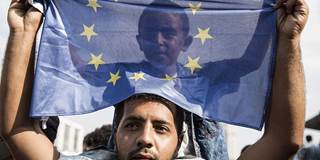When the Cold War ended, the EU and NATO were at the center of an expanding unipolar order that, it was assumed, would establish the conditions for European security. In fact, that was far from guaranteed, as the existential challenge to the European order posed by the refugee crisis and the Syrian conflict shows.
LONDON – People used to think that the most important decisions affecting Europe were made in Paris, Berlin, or Brussels. But in recent months, as the European Union has confronted the refugee crisis, and the Syrian conflict that is fueling it, Moscow and Ankara have come to the fore. And the EU is divided on how to deal with its two disgruntled neighbors, Russia and Turkey, both of which feel increasingly snubbed by the West.

LONDON – People used to think that the most important decisions affecting Europe were made in Paris, Berlin, or Brussels. But in recent months, as the European Union has confronted the refugee crisis, and the Syrian conflict that is fueling it, Moscow and Ankara have come to the fore. And the EU is divided on how to deal with its two disgruntled neighbors, Russia and Turkey, both of which feel increasingly snubbed by the West.